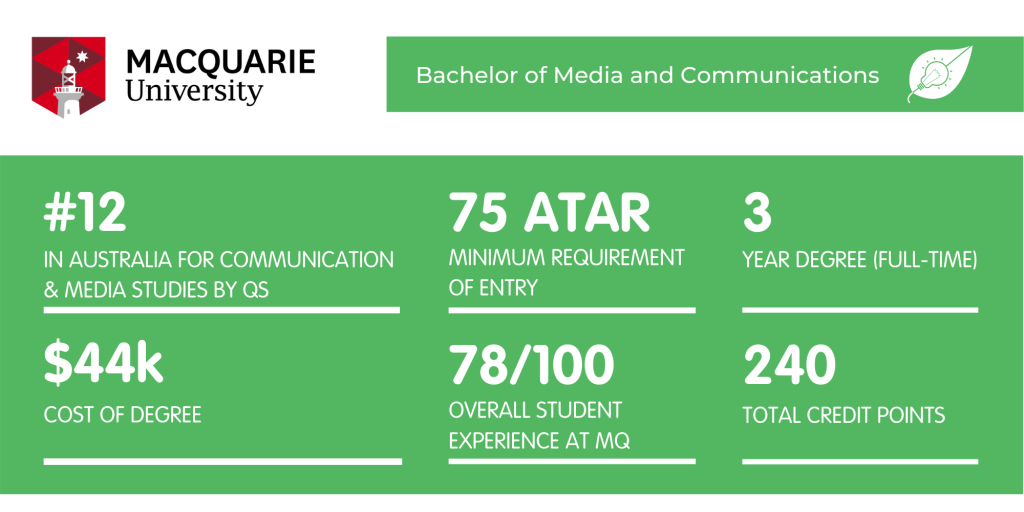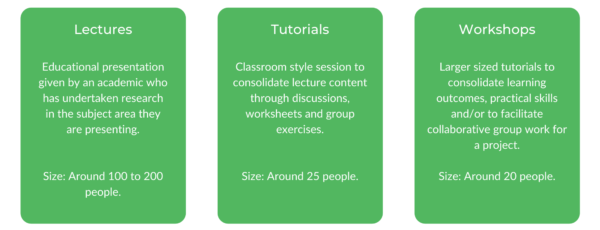Have you always been interested in studying media? Have you ever wanted to work in the production of news and entertainment? If your answer is yes, studying a Bachelor of Media and Communications at Macquarie Uni can take you on that path!
If this piques your interest, this article includes everything you’ll need to know about the the degree — from the core units to faculty culture.
Let’s get started!
What is a Bachelor of Media and Communications at Macquarie?
Core Units and Majors
How to Get into a Bachelor of Media and Communications at Macquarie
What’s the Teaching Format?
What’s the Faculty and Culture Like?
What is a Bachelor of Media and Communications at Macquarie Uni?
In a Bachelor of Media and Communications at Macquarie Uni, students learn the production methods and practices of various media from documentaries to public relations campaigns. Throughout the three-year course, students engage with media and critical theories while specialising into one of five offered majors (or two if you just want to up-skill in another area).
If you choose to study this degree a Macquarie, you’ll have access to great facilities for your media needs. Anything you could possibly need, like a professional studio for screen production, radio production or even music recording, is catered for!
Can this degree be studied in conjunction with another?
Yes! While this may extend your degree, you’ll graduate with an extra qualification which can definitely come in handy in the future and you’ll diversify your skillset. These are the degrees that Media and Communications is often paired with:
Another degree that might pique your interest is the Bachelor of Marketing and Media which gives you the best of both worlds, and it’s only a 3-year degree! If marketing is something you’d like to pursue alongside media, you may want to consider this degree.
Career Paths
Graduates have a wide set of career options in various industries, and depending on their major, they may follow different career paths, including:
-
- Content producer
- Designer
- Film and television producer
- Independent filmmaker
- Journalist
- Policy analyst
- Social media specialist
- Web producer
- Publicist
Read up on a career as a Journalist or a Producer!
Core Units and Majors
There are six essential units (core units) for all Bachelor of Media and Communications students:
First-year units, such as Media Practice and Production, are introductory subjects. Here, the units explore elements of creative expression in media content, particularly concerning text, digital video, image, and sound.
In the second year of study, students start to think critically about media content. They are introduced to critical theories and perspectives such as psychoanalysis and feminism and its effect on media.
Third year students have the option of choosing one of two elective units. These are Media Ethics and Forensic Media. Media Ethics explores the future of media and how to produce media content informed by ethical decision-making. Forensic Media focuses on social media, drone technologies and its capacity to shape surveillance and news media.
What are the majors/specialisations?
There are five specialisations offered in a Bachelor of Media and Communications at Macquarie Uni, in which there is 80 CP (which equates to 8 subjects) of essential units to complete. These majors are:
A specialisation in Journalism and Non-Fiction Writing leans toward the written side of media such as news media and other public areas. In this major, students learn the process of news media from the methods of reportage and research. Students write stories based on real events and present complex information for various audiences.
A Screen Practice and Production specialisation develops students’ production skills for any media on the screen from cinema to documentary. This will encompass screenwriting, filming, editing, and critical analysis where students address the current issues in screen media.
Can you complete an internship?
The third year of a Bachelor of Media and Communications at MQ Uni incorporates the unit Media Internship.
In this unit, students undertake a minimum of 45 hours in a media-related role based on their specialisation. Under the supervision of media professionals, students will refine their skills and capacities in practical, real-world settings!
How to Get into a Bachelor of Media and Communications at Macquarie Uni
The ATAR cut-off for a Bachelor of Media and Communications at Macquarie is 75.
If your ATAR mark hasn’t met this cut-off, check the Macquarie Entry Navigator for a range of other options for entry! For example, with the Academic Advantage entry, students are eligible to 3 adjustment points if they have achieved a Band 6 in English (Advanced), Legal Studies, Modern History and other certain subjects.
Alternate Pathway
An alternative pathway to studying a Bachelor of Media and Communications at MQ Uni, without the requirement of meeting the ATAR cut-off, is first to study a Diploma of Arts Media and Communications. Students who have successfully graduated this Diploma with a GPA of 4.7 or a WAM of 60 can then progress to the second year of a Bachelor of Media and Communications.
Fortunately, there is no assumed knowledge or additional assessments when commencing this course. Everyone will have a level playing field!
Scholarships
Though there are no specific scholarships for a Bachelor of Media and Communications, there is a range of scholarships for new undergraduate MQ students.
The Alumni Family Scholarship is offered to current school leavers closely related to a family member (parent, sibling, grandparent) who has also attended Macquarie University. This scholarship provides $5000 per year to the recipient!
Similarly, the Macquarie Education Costs Scholarship offers $5000 per year for successful applicants with demonstrated financial advantage.
What’s the Teaching Format?
A Bachelor of Media and Communications at MQ Uni is taught in two semesters per year and combines lectures, tutorials and workshops.
Class Structure
Lectures
Lectures are large classes with 100 to 200 students in attendance and are usually one to two hours long.
In these classes, students are introduced to the general theory and concepts used in their tutorials and workshops. In specific units, lectures may include prominent guest speakers who are industry professionals — these are especially helpful to gain practical industry tips!
Tutorials
Tutorials have class sizes of no more than 25 students and are usually one to two hours long.
In tutorials, students consolidate their knowledge through discussion, group tasks and presentations. This is a time where they resolve their uncertainties about the lecture content.
Workshops
Certain units of the majors will use workshops to transfer the students’ knowledge into a practical understanding. In workshops, students produce content and practice their specialised media skills with the guidance and feedback of a tutor.
Workshops are small classes of 20 students and usually are one to two hours long. For example, the unit Telling True Stories in the Journalism and Non-Fiction Writing specialisation is taught solely in workshops.
How much time do you spend on campus?
The average number of contact hours for a Bachelor of Media and Communications at MQ Uni is 8 to 10 hours per week.
However, whether a student’s specialisation has more or less practical content can vary their contact hours. For example, Screen Practice and Production majors expect having 9 contact hours for a single unit!
What are the assessments like?
The main assessments in a Bachelor of Media and Communications at MQ Uni are final projects, quizzes and essays.
No matter the form (documentaries, scripts, journalistic writing), every major is focused on the production of media content to an industry-grade standard. Therefore, final projects are prioritised in assessments and normally weigh up 50% of the unit.
Essays are usually a mid-semester assessment where students will demonstrate their comprehension of critical theories by analysing case studies. Quizzes are similar to essays, however, they are taken in-class or online under a time specification — these assessments weigh around 20 to 30% of the unit.
In later units, the assessments will focus more on the creative work and how it is underpinned by theory, rather than just the comprehension of the theory.
Skills That You Refine and Learn
Students gain the essential production skills for completing media projects such as adhering to the technicalities and using necessary equipment of the form. As the main goal of their content is to communicate ideas and knowledge, students explore methods and experiment to find their style of creative expression.
As part of their comprehension of critical theories, students develop a critical eye to both the creative and socially-ethical decisions presented in the public content. By learning the history and various perspectives on the impact of media, students will learn to critique case studies and their own work for its strengths and weaknesses.
What’s the Faculty and Culture Like?
Faculty
The Media, Communications and Performing Arts Faculty have consistently supported students’ learning and wellbeing. During the final year of a Bachelor of Media and Communications at Macquarie, tutors provide constant guidance for students in terms of employment and help prepare them for life as a graduate.
Culture
The on-campus atmosphere at Macquarie Uni is very lively and offers diverse activities from various student groups. With an event every week from societies and clubs, students can get new perspectives and form new interests along with like-minded people!
For example, the youth-run group AIESEC holds leadership events, multicultural days and even offers an opportunity to volunteer on a global exchange!
For students wishing to have their work published, the university publication Grapeshot is a great start to build their portfolio or even work on the editorial team!
Want to learn about the pros and cons of this degree? Check out our article here!
Lynn Chen is a Content Writer at Art of Smart Education and is a Communication student at UTS with a major in Creative Writing. Lynn’s articles have been published in Vertigo, The Comma, and Shut Up and Go. In her spare time, she also writes poetry.






